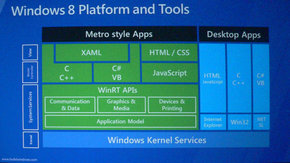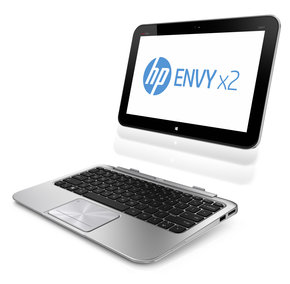
At first glance the decision to support ARM processors in Windows 8 seemed to be all about compatibility with the only hardware capable of the extended battery life necessary for a modern tablet. That's certainly how Microsoft described it from the beginning. However the biggest differences between Windows 8 for ARM (Windows RT) and the standard version of Windows 8 actually ended up being an unprecedented level of control and lack of user options.
Unprecedented for Windows anyway. It's actually almost identical to the type of control Microft built into Windows Phone 7 where a walled garden reminiscent of Apple's tightly controlled app environment is standard. It's pretty clear that Microsoft's goal with Windows RT, which also happens to be essentially the tablet version of Winodws Phone 8, restricting tablet users to installing apps via Microsoft's official app store.
In other words Windows RT doesn't allow you to just download software from whatever website you want. The Windows Store has an app approval similar to what Apple uses for the iTunes App Store. Even if you want to give your software away, you will have to get Microsoft's permission to do so first. They will have to approve of both the content and the UI which, among other things, means every app is required to be based on the new Windows Runtime API.
Just like Windows except when it isn't
For all their talk about how Windows RT benefits from the familiarity of Windows, in most ways it is more of a departure than a continuation of the existing Windows line. In fairness to Microsoft sometimes you need to turn your back on the past to reach the future. For many years it was the need to support legacy code
Related articles
What they're doing with Windows RT, though, takes that philosophy to the extreme by dropping all support for legacy applications. In and of itself that's not necessarily a big deal. In fact it's standard for a mobile OS. From Symbian to iOS to Android, many mobile operating systems have been based on desktop originals (OS X and Linux) but none of them supports the full range of software usable on the desktop equivalent. On the other hand Nokia, Apple, and Google didn't claim such compatibility existed either.
That's a key part of Microsoft's strategy for selling Windows RT tablets. "It's real Windows," they're saying. "It's compatible with the same software you can run on Windows 8 and look, it even comes with Microsoft Office." What they really mean is that it's compatible with all the software they expect to be available in the future as developers flock to the Windows Store to reach Windows RT tablet buyers.
Is that really a recipe for success? This is perhaps too complicated a question to answer but maybe it's simpler than it seems if you distill it into two simpler questions. Why do people buy Windows and does Windows RT meet their expectations? Of course there are many answers to the first question, but if you look at a broad cross-section of Windows users you will probably find the familiar interface and broad software support at or near the top of the list.
The Windows RT identity crisis
Assuming those factors remain important to Windows' future it seems reasonable that the standard x86-based version of Windows is still the key to Microsoft's success in the OS market. In fact it's easy to see x86 tablets (really tablet-laptop hybrids) not just outselling their Windows RT counterparts but even making them irrelevant.
Thanks to significant improvements by Intel in the design of their Atom mobile processors, combined with changes to the core architecture of
 Windows, these devices will be nearly able to match the power efficiency and battery life of ARM-based tablets. Just as importantly, or perhaps moreso, they will be able to do so without dropping support for the mountain of legacy software Windows users have come to expect and rely on.
Windows, these devices will be nearly able to match the power efficiency and battery life of ARM-based tablets. Just as importantly, or perhaps moreso, they will be able to do so without dropping support for the mountain of legacy software Windows users have come to expect and rely on.
For the average consumer this may not be the most important factor in choosing a tablet. The success of iOS and Android clearly show that millions of people don't really care about legacy support. If anything the most important features to a tablet buyer, at least to this point in time, aren't features a PC has to begin with. For those people Windows RT may have some appeal, at least in the same sense that Windows Phone has appeal to smartphone buyers in a market where Android and iOS already dominate.
Legacy support and legacy CPUs
For people who need (or at least want) the Windows experience, on the other hand, it won't be any substitute for standard Windows 8. Clearly HP and Acer, two of the three biggest PC vendors in the world, share that point of view. In fact not only have both chosen to stick with Atom-based Windows 8 tablets at least through the end of the year, they have also declined to even commit to even participating in the Windows RT OEM program.
In HP's case this seems like an entirely obvious strategy. In the business market, where they are still arguably the most important player, support for legacy programs isn't just a matter of convenience. It's a non-negotiable requirement.
 Between that and the complete failure of HP's own tablet, the TouchPad, it's hardly surprising that they're not prepared to commit to Windows RT.
Between that and the complete failure of HP's own tablet, the TouchPad, it's hardly surprising that they're not prepared to commit to Windows RT.
Acer's decision is perhaps a little more surprising and certainly more troubling for Microsoft. Acer's success comes primarily from the mass market where the convenience and simplicity of Windows RT would seem to trump the legacy support of Windows 8. Their concerns are more likely motivated by skepticism about Windows RT's ability to compete with Android. While that concern does not appear to be shared by other high end Android tablet vendors like Samsung and ASUS, it's a fair question.
If what you want is a Windows experience why choose Windows RT over Windows 8? If you that's not what you're looking for why buy a Windows tablet of any kind?
Written by: Rich Fiscus @ 14 Oct 2012 10:45
